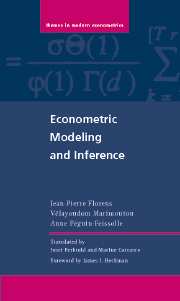
-
The digital format of this book is currently unavailable for purchase. Other formats may be available.
-
Select format
-
- Publisher:
- Cambridge University Press
- Publication date:
- 05 June 2012
- 02 July 2007
- ISBN:
- 9780511805592
- 9780521876407
- 9780521700061
- Dimensions:
- (228 x 152 mm)
- Weight & Pages:
- 0.802kg, 518 Pages
- Dimensions:
- (228 x 152 mm)
- Weight & Pages:
- 0.682kg, 518 Pages
You may already have access via personal or institutional login
Book description
Presents the main statistical tools of econometrics, focusing specifically on modern econometric methodology. The authors unify the approach by using a small number of estimation techniques, mainly generalized method of moments (GMM) estimation and kernel smoothing. The choice of GMM is explained by its relevance in structural econometrics and its preeminent position in econometrics overall. Split into four parts, Part I explains general methods. Part II studies statistical models that are best suited for microeconomic data. Part III deals with dynamic models that are designed for macroeconomic and financial applications. In Part IV the authors synthesize a set of problems that are specific to statistical methods in structural econometrics, namely identification and over-identification, simultaneity, and unobservability. Many theoretical examples illustrate the discussion and can be treated as application exercises. Nobel Laureate James A. Heckman offers a foreword to the work.
Reviews
'This book is invaluable to researchers and all who are interested in the statistical analysis of time series, microeconomic data, financial and econometric models.'
Source: Journal of Applied Statistics
'… this book … make[s] a great contribution to teaching the next generation of theoretical econometricians. … Econometric Modeling and Inference provides an excellent, low- cost opportunity to catch up with what the econometrics subfield has been doing.'
Source: Journal of the American Statistical Association
Contents
Metrics
Altmetric attention score
Full text views
Full text views help Loading metrics...
Loading metrics...
* Views captured on Cambridge Core between #date#. This data will be updated every 24 hours.
Usage data cannot currently be displayed.
Accessibility standard: Unknown
Why this information is here
This section outlines the accessibility features of this content - including support for screen readers, full keyboard navigation and high-contrast display options. This may not be relevant for you.
Accessibility Information
Accessibility compliance for the PDF of this book is currently unknown and may be updated in the future.


